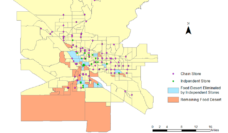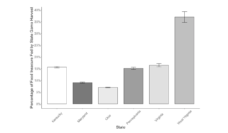“A lot of our inventory comes from Greater Boston Food Bank. We have local businesses that donate bread, like Great Harvest. Newton Community Farm gives us produce. We purchase diapers, and baby food. We work with Hope and Comfort to get personal care items. We work with Dignity Matters to get menstrual products,” explains Dr. Regina Wu, president of the Newton Food Pantry, referring to the way local community partners donate much more than food to the pantry.
“The way that it works is anybody who has an address in Newton, or are homeless–but their area of work, or study, is in Newton– can come to us,” she says. “No referral required. We removed that barrier to access, recognizing that if people say they need food, we want to help them. Since COVID-19, we recognize the need is greater.” Health issues and lost jobs due to COVID-19 exacerbated food insecurity in the area, but the Newton Food Pantry continued to serve the community.
“I really have to give a lot of credit to all of the volunteers, and the leaders in our organization,” says Wu, also a primary care physician, referring to the initial days after COVID-19 struck. “We did not close. With an abundance of caution, we had to move and pivot everything outside, and started doing pre-packed bags. The cars would line up in our circle, and be given bags. I think the numbers were kind of startling at first.”
The pandemic brought new challenges. “We previously had a volunteer base that was largely retired seniors. Many of them had to step aside to keep themselves safe.” But a few opportunities stemmed from the pandemic: “We recognized there were a lot of seniors who were living in the same housing complexes. Instead of having them come independently, we started a bulk delivery service where we had caravans of our volunteers taking groceries to the different Newton Housing Authority buildings.” Volunteers also brought groceries to those who were medically homebound.
The Newton Food Pantry has found more opportunities to help people in need, including two off-site initiatives so that people who do not live in Newton can access food. “One is the Lasell University Partnership. We have a dry pantry that’s open to all staff and students. The second strategy is a free refrigerator that we organize and run. It’s called the Newton Community Fridge.” This anonymous and free fridge allows people who might not be comfortable coming to the pantry to obtain food. The motto of the Fridge is: “You take what you need, and you leave what you can.”
About 60% of clients of the Newton Food Pantry speak a language other than English. Wu explains that to continue to be client-focused, “We started a program where we are providing culturally relevant foods. For the past year, we have been shopping at three different local specialty stores to provide Asian, Latinx and Eastern European groceries, things that our clients can use to cook meals that remind them of home.”
Wu reminds us that during the holidays there is a greater need in the Newton Food Pantry. “When people are trying to do something a little more special for their families.” The end of the school year and the loss of school meals also increases family needs.
“We are largely volunteer driven. It takes about 90 volunteers a week to order our food, get it to us, and unload it. Volunteers prepare the pantry so it looks like a free grocery store, and it feels dignified for the clients to come in and see this beautiful space filled with produce.” says Wu, who is always on the look-out for new volunteers. The pantry also has people who do fundraising, communications, and marketing. “Even if you want to grow some herbs in your backyard, and donate herbs to the Fridge, bring them in, we’ll be happy to take them.”
Photo provided
This is the first post in a three-part series this month about how food banks and food pantries contribute to food security.














